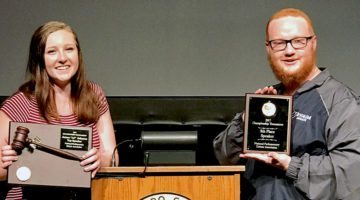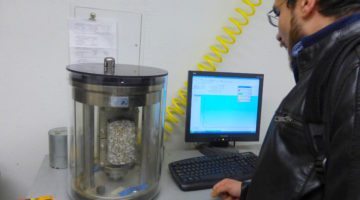By: Lauren Huneycutt
While awaiting their mother Janine Winkelmaier to return home for dinner time, Garrett Winkelmaier, 21, and Drew Winkelmaier, 17, decided to play a practical joke on her and hide an unopened, Costco size bag of Halloween candy. Not only did they hide the candy, they scattered the bag and multiple wrappers all over the staircase. Upon walking through the door, Janine apologized for being late, explained the awful traffic and began asking about dinner, when she stopped mid-sentence. The expression on her face went from flustered to concerned in less than a second. Questioning her boys on what had happened, she instantly looked at the dogs.
“How did they get to the candy? That’s your dog too, Garrett, aren’t you worried?”
The boys could not hold their poker faces long before they burst out in laughter. This lighthearted joke is one of many welcomed, happy moments in the daily life of the Winklemaier household. When meeting this family there are no noticeable scars of the nightmare that was once their reality.
Finding Home
The Winkelmaier family planted its roots in Reno, Nevada, over 20 years ago. George Winkelmaier loved coaching both of his boys’ baseball teams as they were growing up. Garrett and Drew Winkelmaier’s neighborhood was filled with other kids the same age, kids that would turn into lifelong friends and whose parents would become close friends as well.
“I didn’t want to come here,” Janine Winkelmaier said. “But thank god we did. We would have never gotten through all this otherwise.”
Originally living in Seattle, Janine and George Winkelmaier decided to make the move to Reno. This location change would prove to be one of the best choices they made together.
Seven years back, as a freshman in high school, Garrett Winkelmaier began watching his father battle with illness. George Winkelmaier was diagnosed with a rare autoimmune disease. At the time, Drew Winkelmaier was only in sixth grade, so the decision was made not to worry him about his dad’s health until necessary.
“The autoimmune disease made him more susceptible to cancer and they warned us of that, but as time goes on and they get better, you get less and less concerned, so we were kind of blindsided,” Janine Winkelmaier said.
One year after his autoimmune diagnosis, George Winkelmaier was tested, then diagnosed with advanced bile duct cancer and given six months to live. He fought and survived the next three and a half years.
“My dad fought for so long, our lives almost got back to normal,” Garrett Winkelmaier said. “He was tired and exhausted, but he would always come to our baseball games, even if it was the only thing he did that day.”
George Winkelmaier’s quality of life did not waver in his years of sickness. His tall slender frame, white smile, goatee and gray hair depicted a healthy man.
“George was so humble,” Janine Winkelmaier said. “He was quiet and hardworking, but man did he have a sense of humor. It was a hidden one, but once you saw it, it was unforgettable.”
He always completed his work at the office, even with his boss telling him to go home and rest. He saw Garrett Winkelmaier graduate high school and go to Western Oregon with his best friend, Dylan Smith, to play baseball. He even found time to visit the boys in Oregon between his consistent chemotherapy treatments, which he tolerated gracefully. He also saw Drew Winkelmaier begin his high school career.
“George survived 99 percent as long as he did because of the boys,” Janine Winkelmaier said. “Maybe one percent me.”
Janine and George Winkelmaier met and began their relationship while they were living in two separate states. After two months of dating, they were engaged. After nine months of being together, they were married.
“I purposefully tried to pick a fight with George once just to see if he would even fight back,” Janine Winkelmaier said. “He wouldn’t. It was just the kind of guy he was, lighthearted and easygoing.”
From the beginning, they knew they were right for each other. They were a match, wanted the same things and had a solid foundation to build a family on.
“George and I were soul mates,” Janine said. “Our family was strong from the beginning, but got stronger after everything we went through. We are more open with each other now because you never know when it’s going to be too late to say something.”
The Fight
Toward the end of Garrett Winkelmaier’s first college baseball season, he began having a hard time with his pitching shoulder. After games, it would swell an abnormal amount and on occasion, turn blue. Winkelmaier had it checked and was told not to worry, so he rested his arm until it felt better. Upon returning to Reno for the summer, he did his best to play summer ball. However, the pain returned and bothered him enough to go and get his shoulder checked.
“You know you’re screwed when the guy doing your scan leaves and says he has to go find a doctor,” Garrett Winkelmaier said.
There was a blood clot in his subclavian vein. So Garrett Winkelmaier checked himself into the ER as instructed, where he spent the night in cardiac care. If the clot were to breakup and move on its own, it would have gone straight to his brain. The original goal was to remove the clot. But after 24 hours of poking and prodding the clot, as well as injecting medicine into it, it still did not break or loosen. The clot had scarred over and become a permanent part of his vein, blocking three inches of it and constantly restricting blood flow. The doctors called it a career ending injury. He is still living with the after affects of this injury today.
George Winkelmaier’s decline was rapid. The doctors and the family knew his time was drawing to a close.
“I didn’t ask the doctor how much time he had, I just asked whether or not his son should move home,” Janine Winkelmaier said. “His answer was yes.”
Garrett Winkelmaier headed home from Oregon at the beginning of December during his sophomore year of college for his Christmas break, knowing it would be a permanent move. He had enrolled at the University of Nevada, Reno and was prepared to start classes in January. Drew Winkelmaier then became aware of the seriousness of his father’s health.
“You don’t realize it’s the end,” Janine Winkelmaier said. “You just don’t get it until it happens.”
Two days after a Christmas with the family George Winkelmaier passed. With the support and help of family and friends, a funeral was quickly planned.
Mackenzie Hunter, Winkelmaier’s long-time girlfriend flew in from Oregon to be with him and to offer her support. Around the same time and through the commotion, Garrett Winkelmaier had begun to notice a lump forming on his collarbone next to the location of his blood clot. A family friend and doctor inspected the lump in their home. Believing the lump was a form of drainage from the clot, he advised them not to worry, but to get it checked as soon as they could get an appointment.
“My first thought was, ‘I cannot tell my mom,’” Garrett Winkelmaier said. “How can I tell her something like this.”
He did call and she came down to the doctor’s office to hear the results of the biopsied lump. When talking to one of the oncologists, Janine Winkelmaier stood her ground and was very firm. She wanted the doctor to be 100 percent sure of the diagnosis before telling her son that he had cancer.
“We were all still in a fog almost. We just had the funeral a couple days before and then we got this diagnosis,” Janine Winkelmaier said. “I was just thinking, ‘no. No. It had to be a dream. Well not a dream, a nightmare.’”
Garrett Winkelmaier had a full body scan that day, along with multiple other tests.
“His chest lit up like a Christmas tree,” Janine Winkelmaier said.
Two weeks after his father passed away, at the age of 18, Garrett Winkelmaier was diagnosed with stage II Hodgkin’s Lymphoma. The blood clot in his shoulder was a small warning of this diagnosis. Blood clotting and fatigue were the two symptoms Winkelmaier displayed, but over all his signs were minimal. The full body scan showed a tumor roughly the size of a brick in his chest. A rigorous treatment plan was being arranged by the doctors for Winkelmaier. He had to put his education on hold to take care of himself. His treatment plan consisted of chemotherapy once a week, on occasion twice a week, every week, for three months, followed by radiation every day for a month after that. Because of the location of the tumor, it would have been a dangerous and grueling surgery to remove it. It was underneath his lungs, which would have required doctors to break his ribs in order to reach the area, so the plan was to shrink the tumor with the therapies.
Winkelmaier’s girlfriend was being kept in the loop via phone calls at this point. The strains of a long distance relationship just increased tenfold.











